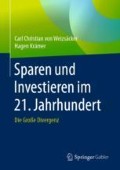Zusammenfassung
Friedrich List 1841 extrapolierend erklären wir das Paradoxon China: Ein armes Land kann gerade dadurch stürmisch wachsen, dass es im Saldo Kapital exportiert und nicht importiert.
Mehr Wachstum der Entwicklungsländer kann durch Leistungsbilanzüberschüsse gegenüber der Region OECD plus China erzeugt werden. Die Staatsschulden der Region OECD plus China müssten dann so gesteuert werden, dass dort trotz des Leistungsbilanzdefizits Vollbeschäftigung erhalten bleibt. Eine solche Politik gereichte beiden Welten zum Vorteil.
Diese Gedanken sind vorerst Utopie. Ihre Verwirklichung bedeutet einen zusätzlichen Strukturwandel, der zu dem der Digitalisierung noch hinzukommt. Der Widerstand derjenigen, die hierbei ihre Arbeitsplätze verlieren könnten, wird dafür sorgen, dass eine derartige Umstellung der Welthandelspolitik für lange Zeit politisch nicht möglich sein wird.
Access this chapter
Tax calculation will be finalised at checkout
Purchases are for personal use only
Preview
Unable to display preview. Download preview PDF.
Literatur
Bernanke, Ben. 2005. The global saving glut and the U.S. current account deficit. Speech 77. Washington (D.C.): Board of Governors of the Federal Reserve System.
Easterly, William Russell. 2006. The White Man‘s Burden: Why the West‘s Efforts to Aid the Rest Have done so Much Ill, and so Little Good. London: Penguin Press.
Friedman, Milton. 1968. The Role of Monetary Policy. American Economic Review 58 (1): 1-17.
Hamann, Brigitte. 1978. Rudolf – Kronprinz und Rebell. Wien: Amalthea.
Hicks, John R. 1937. Mr. Keynes and the Classics – A Suggested Interpretation. Econometrica 5 (2): 147-159.
Kopisch, August. 1836. Gedichte. Berlin: Duncker und Humblot.
List, Friedrich. 1841. Das nationale System der politischen ökonomie. Stuttgart: Cotta.
Marx, Karl und Friedrich Engels. 1846. Die deutsche Ideologie. In Karl Marx. Die Frühschriften, hrsg. Siegfried Landshut, 339-485. Stuttgart: Kröner 1955.
Author information
Authors and Affiliations
Corresponding author
Rights and permissions
Copyright information
© 2019 Springer Fachmedien Wiesbaden GmbH, ein Teil von Springer Nature
About this chapter
Cite this chapter
von Weizsäcker, C., Krämer, H. (2019). Weltökonomie nach dem Ende der Kapitalknappheit: Ein utopischer Entwurf. In: Sparen und Investieren im 21. Jahrhundert. Springer Gabler, Wiesbaden. https://doi.org/10.1007/978-3-658-27363-7_12
Download citation
DOI: https://doi.org/10.1007/978-3-658-27363-7_12
Published:
Publisher Name: Springer Gabler, Wiesbaden
Print ISBN: 978-3-658-27362-0
Online ISBN: 978-3-658-27363-7
eBook Packages: Business and Economics (German Language)

